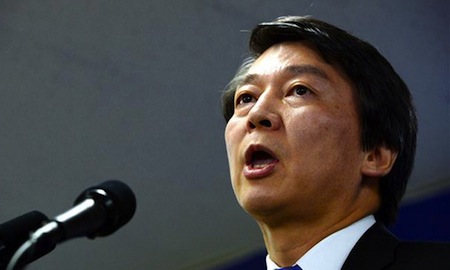Last Friday, independent presidential candidate Ahn Cheol-soo dropped out of the South Korean presidential race.![]()
Without a doubt, his decision has transformed the race from a three-way contest between one conservative and two liberals, which was destined to favor the conservative candidate, Park Geen-hye of the Saenuri Party (새누리당 or the ‘Saenuri-dang’) into a direct showdown between the two dominant brands of politics in South Korea over the past half-century.
Before his withdrawal, Ahn was splitting the support of liberal voters with Moon Jae-in of the Democratic United Party (민주통합당, or the ‘Minju Tonghap-dang’).
Now Moon and Park are in a much closer race, although the latest polls give Park a slight edge (the latest Realmeter poll from Nov. 30 shows Park with 49.9% support and Moon with just 44.2%). Polls routinely showed that before his withdrawal, Ahn, if anything, was the stronger candidate against Park (not Moon).
It’s still unclear why Ahn dropped out so suddenly — in an interview last week prior to his withdrawal, he indicated he had no intentions of bowing out. But by falling on his own sword, Ahn has made himself even more popular by apparently putting the cause of defeating Park ahead of his own personal ambitions. Now in the position of a potential kingmaker, Ahn can trade his vigorous support for Moon (Ahn has already somewhat gracefully called on his supporters to vote for Moon) for a role in a potential Moon administration, which could give Ahn governmental experience in advance of the 2017 election.
For such a liberal candidate, it’s a little shocking to see polls that show only 50.7% of Ahn’s former backers are committed to Moon with less than three weeks to go until the election, even though over 70% of Ahn’s supporters want to see a change in administration from the current Saenuri Party. Fully 26.4% of Ahn backers apparently support Park and 21.9% remain undecided — Moon cannot win unless he (with or without Ahn’s help) can migrate more of Ahn’s former supporters into his own camp.
Ahn’s popularity has been somewhat of a phenomenon in South Korea since he first flirted with running in Seoul’s mayoral race in October 2011 — although he failed to enter that race, which polls showed he could have won, he backed Park Won-soon, another liberal independent, who ultimately won the Seoul election. Ahn spent the better part of 2012 teasing a presidential campaign that he announced only in September of this year.
Ahn, himself, is a businessman by background — he founded AhnLab, Inc. in March 1995 (think of it as South Korea’s version of McAfee or any other anti-virus software company). Until he launched his now-aborted presidential campaign, Ahn was a graduate school dean at Seoul National University.
Park, the daughter of Park Chung-hee, South Korea’s authoritarian leader from 1961 to 1979, represents in many ways the quintessence of South Korean conservatism, although she’s long been a rival of the current president, Lee Myung-bak. Although Lee belongs to Park’s Saenuri Party, Park worked earlier this year to rebrand the Saenuri Party (once the ‘Grand National’ Party) and managed to win legislative elections against the DUP in April 2012. Since those elections, Park has been seen as a narrow favorite for the Blue House, notwithstanding some amount of wariness about what her candidacy represents.
With 19 days to go until the election, and with the campaigns officially underway as of last week, Moon finally has his clear shot at Park, and Moon will face Park and another minor candidate, Lee Jung-hee, in three debates on December 4, 10 and 16.
Moon, the former chief of staff to former South Korean president Roh Moo-hyun, was once imprisoned under the Park (the father, not the daughter) regime, and was a longtime civil rights lawyer in the fight for South Korean democracy and civil liberties.
In a race where all three candidates — Park, Moon and Ahn — have talked about reducing Korean income inequality, Moon and Ahn are seen as much more liberal on the issue of inequality, as well as more activist on the issue of breaking up Korea’s long-powerful chaebol conglomerate corporations. Ahn and Moon also share a much less hawkish — and more conciliatory — view on relations with North Korea.
Moon and Ahn had spent much of November discussing the possibility of a merged single candidacy, but could not agree on whether Ahn or Moon would lead that single candidacy, and talks fell apart when Ahn walked out of negotiations in mid-November prior to his withdrawal from the race, which was unilateral and not made in concert with Moon’s campaign.
Third candidates have had a strong history as spoilers in past elections in South Korea’s recent electoral past. Kim Dae-jung and Kim Young-sam, competing in South Korea’s first freely open presidential election in 1987, split the liberal vote and allowed the conservative Roh Tae-woo to come to power. The two Kims competed in 1992, although Kim Young-sam narrowly won that election. In the subsequent 1997 election, Kim Dae-jung won in large part because supporters of the then-Grand National Party had split between two candidates.

One thought on “Ahn’s exit clears way for competitive Moon presidential campaign against Park in South Korea”